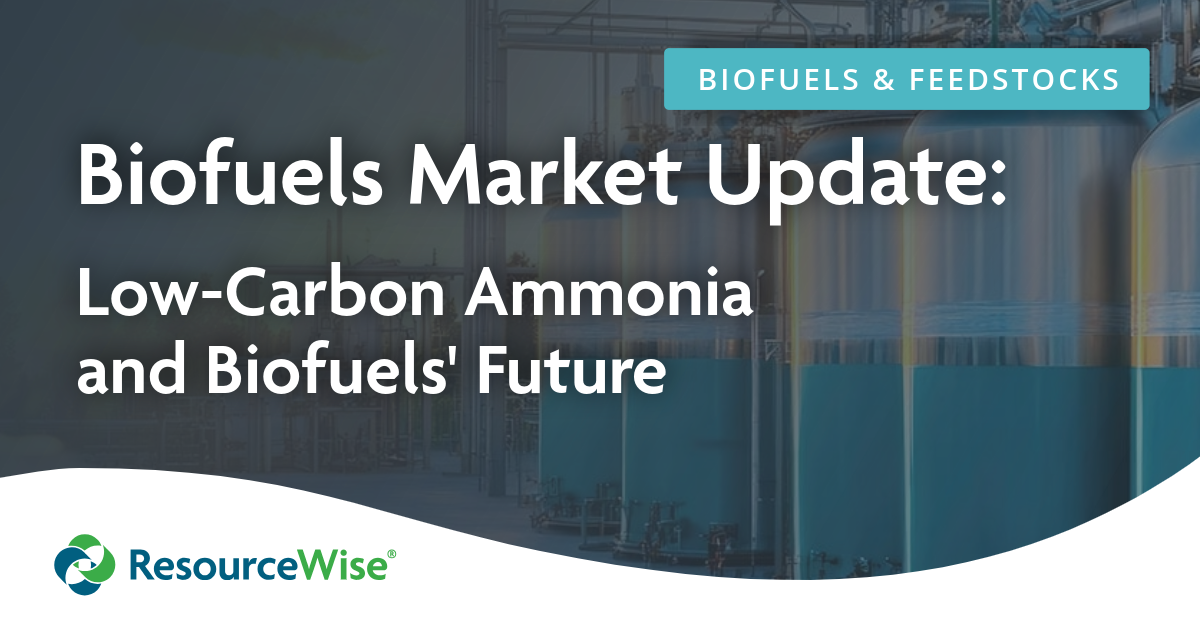2 min read
2023 Year-End Sustainability Trends Focus on Biofuels, SAF
ResourceWise
:
Dec 13, 2023 12:00:00 AM

As 2023 comes to a close, several key sustainability topics have become top-of-mind in the energy market. Biofuels continue to gain prominence and popularity as the call to decarbonize grows even stronger. Breakthroughs in related areas like sustainable aviation fuels (SAF) further amplify a very clear message: the carbon transition is happening right now.
In this post, check out a few of the latest news and insights regarding the development of biofuels and the carbon transition.
United Nations’ COP28 Meeting Focuses on Real-World Solutions
The United Nations Climate Change Conference 2023, also known as the Conference of the Parties of the UNFCCC, just wrapped up their 28th conference in Dubai (hence the COP28 shorthand). One of the guiding themes of this year’s meeting was the “beginning of the end” for the fossil fuel industry. Understanding how we lay out a realistic transition to renewables echoed across the conference.
COP28 has already distinguished itself from previous years because of its focus on more reality-grounded solutions. One of the major elements of decarbonization is, of course, adopting biofuels to replace traditional fossil fuels. Yet the implementation of biofuels has not exactly taken hold at lightning speed.
The compromise in this case is not reinventing the wheel. The international energy system is deeply entrenched in all global commerce. Accordingly, a full-scale replacement of that industry simply isn’t possible.
Solutions are coming instead by way of transitional plans to realistically scale in biofuels in place of fossil fuels. Investment continues to roll into areas outside of the already developed markets in the US and Europe.
For instance, Brazil’s National Oil Agency has now allowed the use of imported biodiesel with the country’s mandatory blending requirements with fossil fuels. Other countries are following suit to stay in line with the growing trend in aggressively investing in decarbonization strategy.
This increasing interest will further boost market competition for feedstocks like international grease from the EU. As momentum increases, we will see even more news about new plants, extended trade borders and emerging markets.
(Source: Prima CarbonZero Green Diesel Europe Report)
Biofuel Adoption and Demand Set to Surge in 2024
Speaking of biofuels, the discretionary demand for renewables has shown immense development with lightning growth expected into 2024. Much of this comes in line with various national and international recommendations and mandates for meeting 2030 decarbonization objectives.
Within the last week, we’ve seen quite a bit in the shipping world related to moving toward more environmentally friendly solutions.
For example, corporate food giant Nestle has announced a new initiative aimed at cutting half of its world shipping to alternative fuels with lower carbon emissions. Striking a deal with three shipping companies, Nestle will decrease its scope 3 emissions through the widespread integration of biofuels in its operations.
Nestle is only one company in a sea of others either actively planning or working on their decarbonization efforts. We can expect to see similar announcements from other companies and organizations into 2024.
(Source: Prima CarbonZero Carbon Mitigator Report)
US Department of Energy Amping Up SAF Adoption, But Clarity Is Needed for Producers
The US DoE Bioenergy Technologies Office, otherwise known as BETO, has recently shared some news about sustainable aviation fuel. The organization plans to incorporate SAF across US-based transportation to meet departmental renewable targets.
The direct focus on SAF reflects a broader trend focused on utilizing this emerging alternative fuel source. As technology and efficiency improves, it’s no surprise that we’re seeing an uptick in SAF adoption.
Related: First 100% SAF Transatlantic Flight, Subsidies Push Renewables
However, confusion remains in terms of how government incentives will benefit various federal agencies. Many SAF producers remain unsure if the blender’s tax credit (BTC) is available to them to help subsidize the higher production costs. Once the government clarifies some of these pain points, we’ll likely see even greater SAF adoption as we move toward 2030.
(Source: Prima CarbonZero Green Diesel US Report)
Don’t miss out on the important news and updates in biofuels and renewable energy. Subscribe to the ResourceWise Sustainability blog to get the insights that are important for your business.





